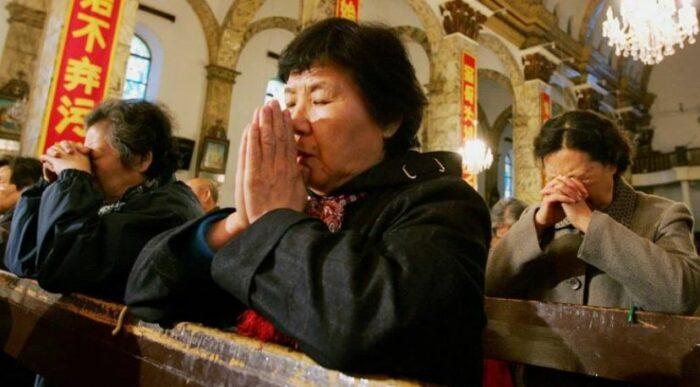
Chinese Bishop Han says following the state rules is important for the Church’s mission and growth.
Newsroom (03/26/2022, 21:40, Gaudium Press) A Chinese bishop, recognized by both state and the Vatican, says all Catholic clergy in China should register with the government to end division among them as state-sanctioned and underground churches.
“What hurts and torments us the most are the situations of disunity and heartbreak between brothers,” said Bishop Joseph Han Zhi-hai of Lanzhou in the province of Gansu in north-central China.
Han made the remarks in a letter he sent to the Vatican Fides agency, on the 20th anniversary of his ordination as the bishop. Fides published the letter on March 20.
Han was ordained with a Vatican mandate in 2003, but in 2017, he sought and obtained recognition from the Chinese political apparatus.
The recognition came a year before the 2018 China-Vatican secretive deal was signed, reportedly agreeing on terms for both parties to jointly appoint bishops in the communist nation.
The 57-year-old Han regretted some bishops did not like being recognized by the state.
During his installation as state-approved bishop in 2017, an official “celebration was organized in the diocese. Some brothers did not accept it and there was still no path of reconciliation,” he recalled.
Catholics Lanzhou Diocese faced state persecution for years before Bishop Han was ordained.
His predecessor, Bishop Philip Yang Libai, who was secretly ordained in 1981 and led the church until he died in 1998, was detained and abused for decades.
Yang, a key figure of the underground episcopal conference established in 1989, had been jailed for more than 30 years in his almost 50 years of priestly life.
Yang was punished for his repeated refusal to join the state-sanctioned Chinese Catholic Patriotic Association. He was kept on a farm for “re-education through labor” by authorities.
Han said when he became bishop 20 years ago, he wrote a letter expressing his desire to join the state-stationed church.
He also appealed to the bishops “to take courage, to be recognized by the political authorities, to accept the laws of the state and thus live openly in full communion with the Universal Church, even in the context of their particular condition.”
“Twenty years later, I perceive that a path of growth has been followed,” Han said.
Pope Benedict XVI himself wrote that “underground ” is not the normal condition for the Church to accomplish its mission, he said.
“This is why I believe that we must respect the law of our country and carry out our apostolic work of proclaiming the Gospel within the framework of the legislation in force in our country.
“We have to deal with so many problems that often bother and worry us. Life is hard, for so many reasons! But the Church is moving forward and carrying out its work and its mission in this situation,” the letter said.
Han said the Church in China faces “a new situation.”
There is a new situation, “in many respects different from that of previous decades (when) there was nothing, something began to emerge,” Has said.
For example, he said, the diocese he administers experienced tremendous growth during the past two decades.
The diocese built or renovated 20 relatively large churches, trained more than 20 priests, and “accompanied the growth of three congregations with 136 religious sisters,” he said.
“Although there are difficulties of all kinds, with the help and closeness of the whole Church, we can face them, even if they are not easy,” Han observed.
The Vatican-China deal, Vatican officials say, was signed with a “pastoral concern” of normalizing the Church life and uniting some 12 million Catholics, now divided as state-sanctioned and underground churches.
The deal was signed in October 2018 for two years and was renewed in 2020 and 2022, each time for two years. The deal reportedly allows both China and the Vatican to accept or reject a candidate for bishop.
But the deal triggered strong opposition from church leaders within and outside China.
Outspoken Cardinal Joseph Zen of Hong Kong termed the deal “a betrayal” and “sellout” of underground Catholics who remained loyal to the Vatican despite state persecution.
Since the deal was signed, six bishops have been ordained in China with both state and Vatican approval, and the Vatican recognized several bishops who were ordained “illicitly” without a papal mandate.
Reports say still about 40 dioceses remain without a bishop.
Besides, rights groups reported Chinese regime has been exploiting the deal to persecute Catholics, aiming to force underground Catholics to join the patriotic church.
However, reports say, millions of Catholics continue to attend underground churches served by Vatican-approved bishops and priests, who refuse to register with the communist government.
- Compiled by Raju Hasmukh with files from UCAN News